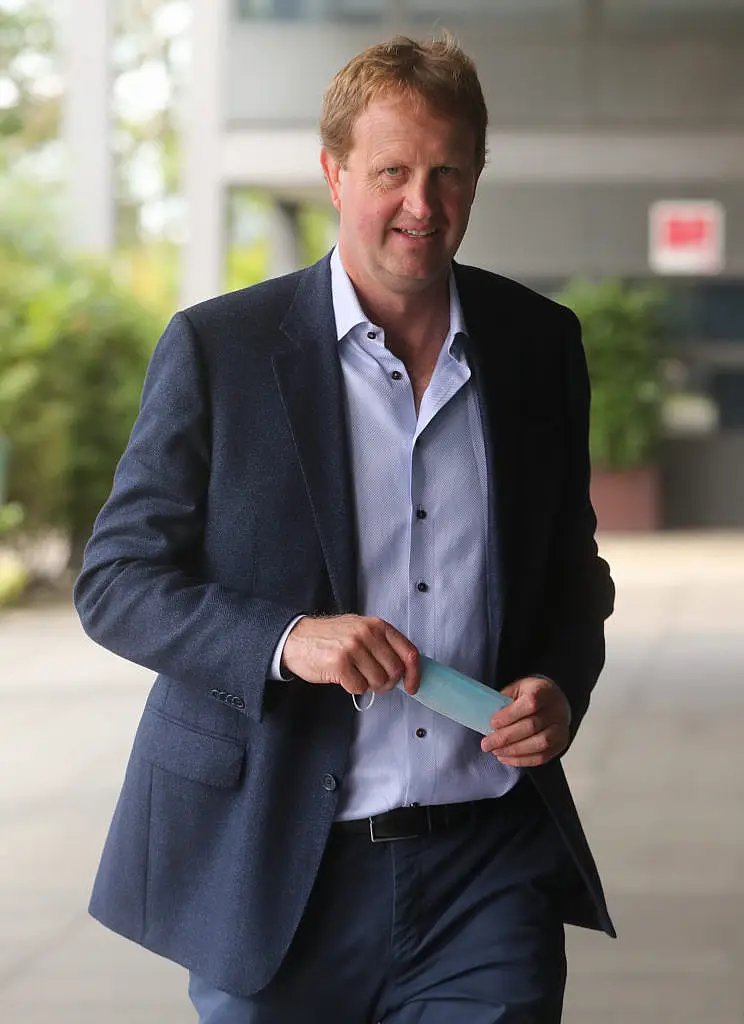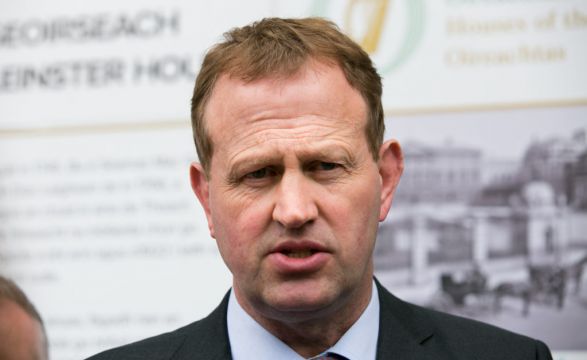Jim O'Callaghan has dismissed reports of unrest in Fianna Fáil, insisting discussion amongst backbench TDs is good for the party, while he remains interested in succeeding Micheál Martin as party leader whenever the vacancy arrives.
Speaking to BreakingNews.ie, the Dublin Bay South TD said: "I can't see the future... I would have thought most members of the parliamentary part would be, of course I'd be interested in it [the party leadership].
"It would be a great honour and privilege to be the party leader. I don't know when that is going to arise, I don't know what the circumstances will be when it does arise, but as I said before, of course I would be interested in being the next leader if any of my colleagues thought I'd be suitable."
Some TDs have reportedly expressed fears about Fianna Fáil losing its identity in the current Government coalition with the Green Party and Fine Gael.
However, Mr O'Callaghan said he does not share this view. He feels the difficulties they have are normal for any party in a coalition.

"I think a three-party coalition, any coalition, is difficult for the parties who are involved in that coalition. It's very easy if you're an opposition party on your own... you don't have to worry about compromising your policies or facilitating your policy differences with your partners in coalition. In fairness, it's always difficult for parties in coalition.
"I don't believe Fianna Fáil has lost its identity, I think we have a strong identity within the Irish political landscape, that's not been lost by being in coalition. As a party we've always desired to be in government, some parties don't want to go into government, I think it's to Fianna Fáil's advantage that we want to be in government."
A recent meeting of backbench Fianna Fáil TDs and Senators was much publicised, with some claiming those involved were unhappy with the leadership.
A number of those present came out after the meeting to say this was not the case.
Mr O'Callaghan, who was at the meeting, echoed these sentiments.
He said backbench TDs speaking out is part of Fianna Fáil's history, and something that is a positive for the party.
It would be unnatural if backbench TDs didn't speak out.
"I was at that meeting, it was a very good meeting, there was a very strong turnout there. Obviously Fianna Fáil TDs and Senators have concerns and want to have their input, we're not people who just sit back and quietly accept orders from the leadership table.
"Other parties might adopt that policy, we don't. Backbench TDs and Senators have a very important role in the party and that's why that meeting was so effective. That shouldn't be misinterpreted as in some way undermining the leadership, it wasn't.
"I think there is benefit in Fianna Fáil not being a party that is seen to be involved in internal bickering, and we're not. In fairness as a parliamentary party, we have been very supportive of our role in government since we went in there two years ago.
"Of course people are going to speak out about issues of concern for them, and it would be unnatural if backbench TDs didn't speak out. I think having vocal backbench TDs is part of Fianna Fáil's strength, and we need to ensure that we are still members of a party where people speak out."
He added: "I'm sure the other parties in coalition do it as well. You hear from backbench Green Party TDs and Senators, same with Fine Gael. That's part of the makeup of the modern political system. If you're going to have a multi-party coalition, you're going to have much more vocal and active backbench TDs and Senators."
The Taoiseach has said he intends to become Tánaiste in the planned rotation with Leo Varadkar in December, and lead the party into the next general election.
Some TDs have been vocal in their view that he should not lead the party into the next general election.
My own view is that I fully recognise that a leader can't turn around and put an end date on their leadership.
Asked where he stands on the subject, Mr O'Callaghan said: "As I said, there's a benefit in not having discussions in the media about internal party issues. All I do know is Micheál Martin will have the best interests of Fianna Fáil at heart.
"My own view is that I fully recognise that a leader can't turn around and put an end date on their leadership. Once that happens they lose authority as a leader and people immediately start going on to discuss the next leadership election.
"I fully understand what he has said in terms of his intentions for the future. My own view is I think it's probably unlikely that he'll lead us into the next election, but I could be wrong. However, I fully understand why he says that."
Mr O'Callaghan was Fianna Fáil director of elections for the Dublin Bay South by-election which Labour's Ivana Bacik won.
It was a disappointing election for Fianna Fáil, and Mr O'Callaghan said: "It's something we can't and shouldn't run away from. It was a very bad electoral result. I'm acutely aware that election was unusual because it turned into a two-horse race between Labour and Fine Gael. That doesn't really reflect where politics is in Dublin or nationally.
"I think the reason we got lost in that election was because it turned into a two-horse race."
There seems to have been a shift in Fianna Fáil's stance on Sinn Féin lately, with the Taoiseach saying he would no longer rule out a coalition with the party.
Mr O'Callaghan was one of the TDs who suggested this previously, and is still of the same view.
However, he feels it is crucial that Fianna Fáil contests the next general election on its own policies and views.
He thinks the party has focused on its rivals too much in the past.
Polarisation
He sees their position as a "centre ground party" as an advantage, and argues that other parties want to see further polarisation in Irish politics.
"My own view is that at the next election Fianna Fáil should contest it on our own policies and on our own record. We should spend our time during that general election talking about Fianna Fáil and our policies, we shouldn't spend our time talking about other parties.
"It's a legitimate question for people to ask, and for voters to know, what's your policy in terms of coalition afterwards? My view is that we should fight the next general election on our record, our manifesto, we should seek to maximise our vote, and after that we should be prepared to sit down and talk to parties that have compatible policies with our own.
Listen, it suits Sinn Féin and Fine Gael to polarise Irish politics.
"We need to be realistic about this as well, at the last election we ruled out going into government with Fine Gael and Sinn Féin. Clearly that was not a sensible policy to adopt prior to the last election, with the benefit of hindsight we can see that. We were too definitive.
"I think there's an advantage in where we are in the political spectrum, we're a centre ground national party that does not want to see extremism, does not want to see the polarisation of Irish politics.
"There are some other parties that want to see that, it would suit some other parties for there to be two big polarised parties in Ireland as in the UK and USA. Irish people don't want that, I think where we are on the political spectrum in the centre, there's a huge advantage to that from a party's perspective.
"I think if we want to retain our position in the centre we should not be ruling in or ruling out any parties for post election discussions.
"Listen, it suits Sinn Féin and Fine Gael to polarise Irish politics, they would like to see Irish politics operate in the same way as politics in the UK where it's completely polarised."
Marc MacSharry, who quit the Fianna Fáil parliamentary party last year after voting against a confidence motion in Minister Simon Coveney, recently suggested the next Fianna Fáil leader should be Dublin-based, mentioning Mr O'Callaghan and Minister for Housing Darragh O'Brien.
When asked if he thinks being based in the capital should be a factor whenever a vacancy does arise, Mr O'Callaghan said it should go to the "best candidate", adding that there may be some positives in regard to strengthening Fianna Fáil's position in Dublin.
"If you look back at the history of Fianna Fáil, we've generally had a rural leader, a Dublin leader, and so on, it has interchanged. It's important that Fianna Fáil retains its position as a national party and what we don't want to become is to be seen as either a rural centric party or a Dublin centric party.
"There's a shrewd electorate who will be deciding who the next Fianna Fáil leader will be, I would have thought that the electorate will look at the best candidate.
"At present we're not as strong in Dublin as we are in other parts of the country, if we want to see our electoral support grow, it probably would make sense for the next leader to be a Dublin leader."







